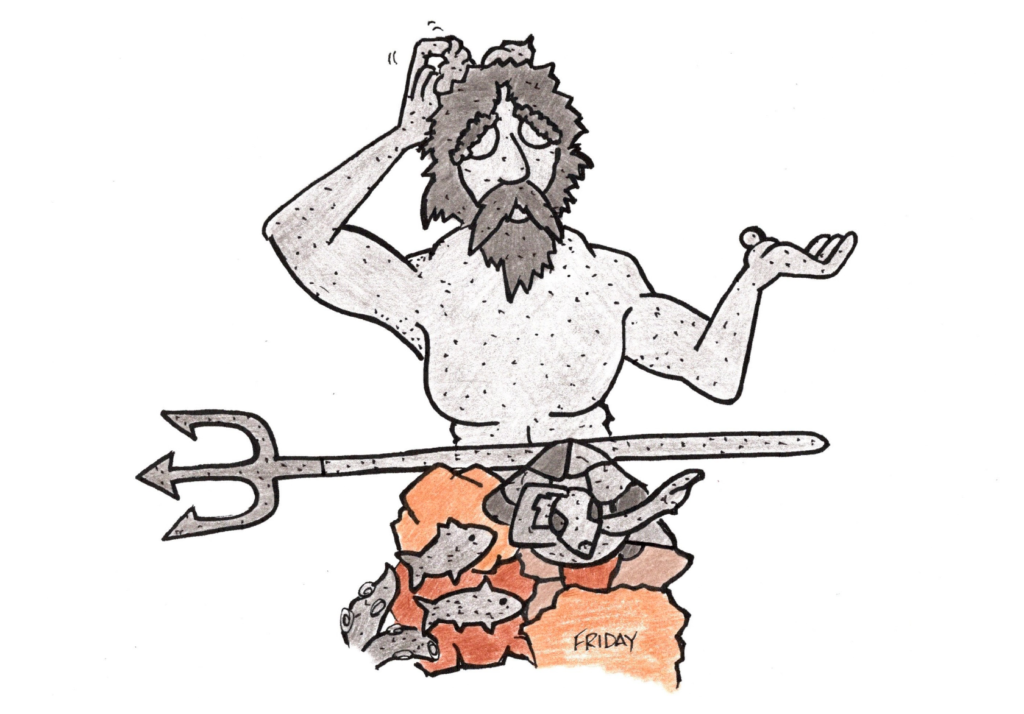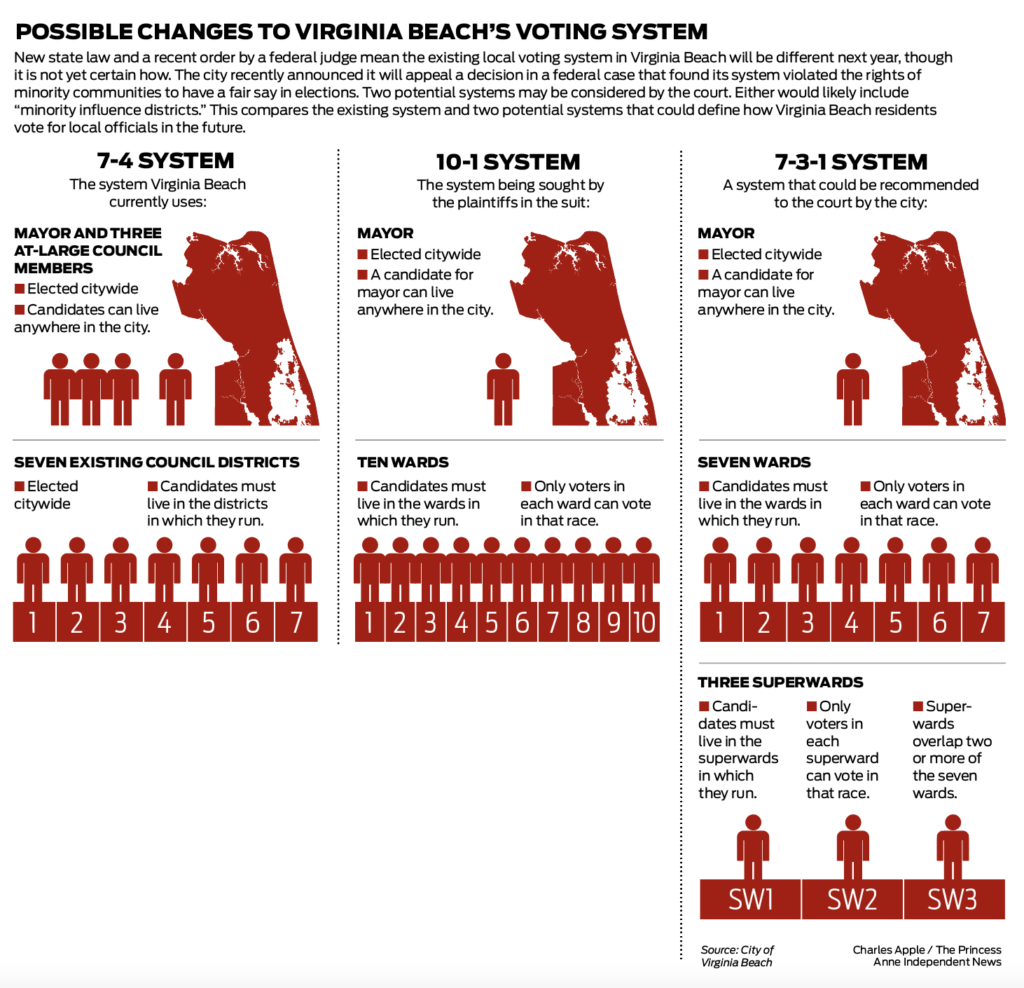
VIRGINIA BEACH — The city will appeal a federal judge’s finding that declared its unusual local voting system illegal because it denies minority communities the right to elect candidates of their choice.
The March order put a stop to the system’s use, and the suit is part of a larger, more complicated situation. Along with new state law passed this year, Virginia Beach’s local voting system will be different next year. A cocktail of circumstances and timing means it is uncertain what that system will look like or when exactly candidates and Virginia Beach voters will know the details.
Almost certainly, Virginia Beach voters will no longer vote in all 11 council contests. Presumably, some of the candidates on the November 2022 ballot will be incumbents elected under the old system. They may be running to represent much different seats by winning over a smaller group of voters.
Among the seats scheduled to be up for election are City Council and School Board seats in the Princess Anne District, which includes southern Virginia Beach and the main coverage area of The Independent News.
“Changes are coming,” Deputy City Attorney Christopher Boynton said during a City Council meeting on Tuesday, June 1. “They’re not potential. We don’t know what they look like yet, but changes are coming by virtue of both state legislation and the federal lawsuit that we’ve been talking about.”
The city announced its decision to appeal in a statement attributed to Mayor Bobby Dyer and released on Wednesday, May 26, a day after the City Council discussed the case during a closed session meeting.
“Despite our best efforts, the parties in the Holloway v. City of Virginia Beach case have been unable to achieve a mutually agreeable settlement,” it said. “The city is therefore proceeding with an appeal of the district court’s decision, which will be filed with the Fourth Circuit U.S. Court of Appeals in June.”
Concurrently, the city will work in a remedial process in the case by submitting a proposal for a system in July. Public hearings on Tuesday, June 8, and Tuesday, June 15, that originally were meant to inform settlement discussions still will be held and now could influence what the city gives the court.
“I think the city’s decision to appeal the trial court’s well-founded decision just goes back to the fact this City Council does not listen to the minority community,” said Chris Lamar, senior legal counsel for the Campaign Legal Center, which represents Latasha Holloway and Georgia Allen, the plaintiffs.
“I’m surprised they’re appealing considering the city’s current method of electing councilmembers is also illegal under state law,” Lamar told The Independent News during a Thursday, June 3, interview. “It just puts this appeal on more tenuous ground.”
Lamar questioned the decision by the city “to continue to argue Blacks, Asian Americans and Hispanics should not be able to elect candidates of choice” in a city and commonwealth that is becoming more diverse.
“The City Council is trying to move backwards when it’s time to go forward,” he said.
Not all members of the City Council agreed with the choice to appeal. City Councilmember Aaron Rouse, who holds an at-large seat, on Tuesday, June 1, said he was not part of the council majority to back the appeal. City Councilmember Sabrina Wooten, who represents the Centerville District, said citizens have told her they are concerned about the expense of continuing the case. It is a concern Wooten shares, and she said she did not support the choice to appeal.
Rouse said the council had an opportunity to hold a referendum on the system last year, a step proposed by City Councilmember Jessica Abbott of the Kempsville District. A divided City Council voted against doing so.
“Whether people supported it or whether they didn’t like it, regardless of the fact, you all – the public – deserved a right and a say so in the matter,” Rouse said.
City Councilmember Barbara Henley, who represents the Princess Anne District, supported the appeal. Henley has defended the existing system, in part, because it gives residents a say in picking all representatives.
“I think the case, as it came down, is factually and legally flawed, and that’s why I think we really have to appeal it,” she said.
In March, U.S. District Court Judge Raymond A. Jackson agreed with the plaintiffs in finding the Virginia Beach system “dilutes the voting strength of Black, Hispanic and Asian American voters” and prevents minority communities from electing candidates of their choice. He found the system is in violation of the U.S. Voting Rights Act.
The city disputes aspects of the case, such as whether minority groups vote as a bloc. The Dyer statement says the plaintiffs can’t show “any single minority group is sufficiently large or compact to constitute a majority within any single voting district.”

For a PDF version of the above graphic explaining potential voting systems please click on this link.
Any new system will need to meet court approval and comply with state laws that challenge aspects of a local “at large” voting system in which people who live outside of seven residency districts have helped determine who represents those districts.
In a possible “7-3-1” system for City Council elections, the mayor would be elected by all city voters, and there would be seven wards and three superwards similar in concept to superwards in Norfolk. Superwards could cover multiple wards but not the entire city, as the four at-large council seats have done under the present system.
The seven wards each would contain about 64,300 residents, and superwards would contain about 150,000 people each.
Candidates would need to reside within a ward or superward. Only people residing within those boundaries would vote to determine their representation. Voters under this system could vote for three members rather than all 11. Two wards and one superward could be drawn as “minority opportunity” districts. The city may still propose this system, which had been part of settlement talks.
The plaintiffs have advocated for a system of 10 geographically distinct wards. Only the mayor – the 11th City Council member – would be elected citywide, according to Boynton and a presentation by City Attorney Mark Stiles to the Virginia Beach Farm Bureau board Thursday, May 27, in Back Bay.
Under such a system, voters would vote for their ward representative and the mayor, meaning two of 11 council seats. Each ward would contain about 45,000 residents.
The case focuses upon City Council, but a new system would likely determine how School Board elections are conducted, too.
“We may still present a 7-3-1 plan – we the city,” Stiles told The Independent News. “I believe the plaintiffs are likely to present a 10-1 plan, but that is up to them to do.”
Henley spoke during the Farm Bureau meeting, where she noted that the city did not hold a referendum last year amid the presidential election and the pandemic. Now, she said, “we really need to have everybody aware of what’s going on.” During that meeting, Stiles said the city is aware of the time pressure to get a system in place and other challenges, such as delays in census data needed to draw political boundaries.
“We’ve got to get a voting system and voting districts and voting maps in time for candidates to know what district they’re running in and who they’re running against,” he said.
The judge will determine the remedy to the suit, and Stiles said the city will comply with the order and turn in its proposal by Thursday, July 1, after hearing from the public. People can sign up to speak during either public hearing or email comments to the City Council via citycouncil@vbgov.com.
© 2021 Pungo Publishing Co., LLC

